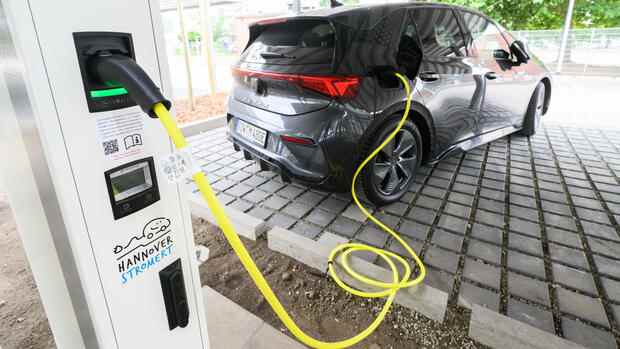The federal government wants to make road traffic more climate-friendly and is setting up advisory bodies for this purpose.
(Photo: dpa)
Berlin With two new councils of experts, the federal government wants to accompany the change in the automotive industry and find a way that people can continue to be mobile without harming the climate. The Expert Advisory Board on Climate Protection in Mobility (EKM) at the Federal Ministry of Transport will join the expert group on the transformation of the automotive industry (ETA), which began work last week under the umbrella of the Federal Ministry of Economics.
It is about securing 1.6 million jobs affected by the transformation and reducing CO2 emissions in the transport sector from 148 million tons today to just 86 million in 2030.
The EKM replaces the National Platform Future of Mobility (NPM) from the previous election period. It brought together 240 representatives from industry and society as well as the affected lobby organizations and environmental associations. They brought together measures that can be used to reduce greenhouse gases on the road, rail, water and in the air. They also determined which investments are necessary in each case and how much CO2 can be saved.
The ETA will continue the work of the expert committee on the future fund for the automotive industry, which was set up briefly in the Federal Ministry of Economics in 2021. The round should determine for the previous government how the state efficiently invests the one billion euros reserved in the economic stimulus package. The government wanted to use the money to support the change in the industry from the world market leader in combustion engine technology to the world market leader in electric or hydrogen vehicles and, if necessary, to retrain specialists if skills were lost. The committee and also the NPM provided contributions for the car summit in the Chancellery, which was officially called “Concerted Mobility Campaign”.
Top jobs of the day
Find the best jobs now and
be notified by email.
It is not yet clear whether there will be a similar round again in the Chancellery with Chancellor Olaf Scholz (SPD). However, the two bodies will work under a steering committee, as was the case with the NPM. It includes representatives from several federal ministries and the heads of the expert groups.
Digitization should help with climate protection
The Expert Advisory Board on Climate Protection in Mobility will have 19 representatives, including a third from science, for example from the TU Berlin, the Karlsruhe Institute of Technology or the Fraunhofer Institute for Software and Systems Technology. There are also lobby groups such as the Federation of German Industries and the Federation of Energy and Water Industries.
The federal states are involved via the conference of transport ministers. With 13 members, the group of experts in the Ministry of Economics has almost the same number as in the last election period. Three organizations are equally represented in both bodies: IG Metall, the Association of the Automotive Industry and Agora Verkehrswende. The non-governmental organization has set itself the goal of decarbonising the transport sector. Its financier, the Mercator Foundation, will also have its own seat on the committee.
The Ministry of Transport hopes that the EKM will provide “further impetus for climate protection in mobility”, as stated in the invitation to the kick-off meeting. It should deal with questions of acceptance of the measures and the effect of digitization on climate protection. “Until the end of the current legislature”, the advisory board is intended to help achieve the climate protection goals.
The problem: Minister Volker Wissing (FDP) has to explain by July 13 how he intends to meet the climate targets again. This is what the Climate Protection Act provides. Because the transport sector missed its CO2 targets by several million tons in 2021, the minister must take countermeasures. Wissing, however, rejects bans such as a speed limit and points out how important it is that proposals are also accepted by the public. For example, he relies on more electric cars and more train journeys.
Climate protection: Medium and long-term measures are to be launched in 2023
Climate protection minister Robert Habeck (Greens) obviously accepts the plan to achieve the goals in the medium and long term rather than in the short term. For example, a draft for an immediate climate protection program by the Federal Government states that a “Platform for climate protection in mobility” should develop “a specific bundle of socially and economically viable measures to reduce the remaining CO2 gap by the end of 2022” instead of immediate measures . “The focus of this project is on measures that are effective in the medium and long term, which can be launched in 2023.”
More: “Service provider of modern mobility”: Wissing gives truck inspectors a new name.
